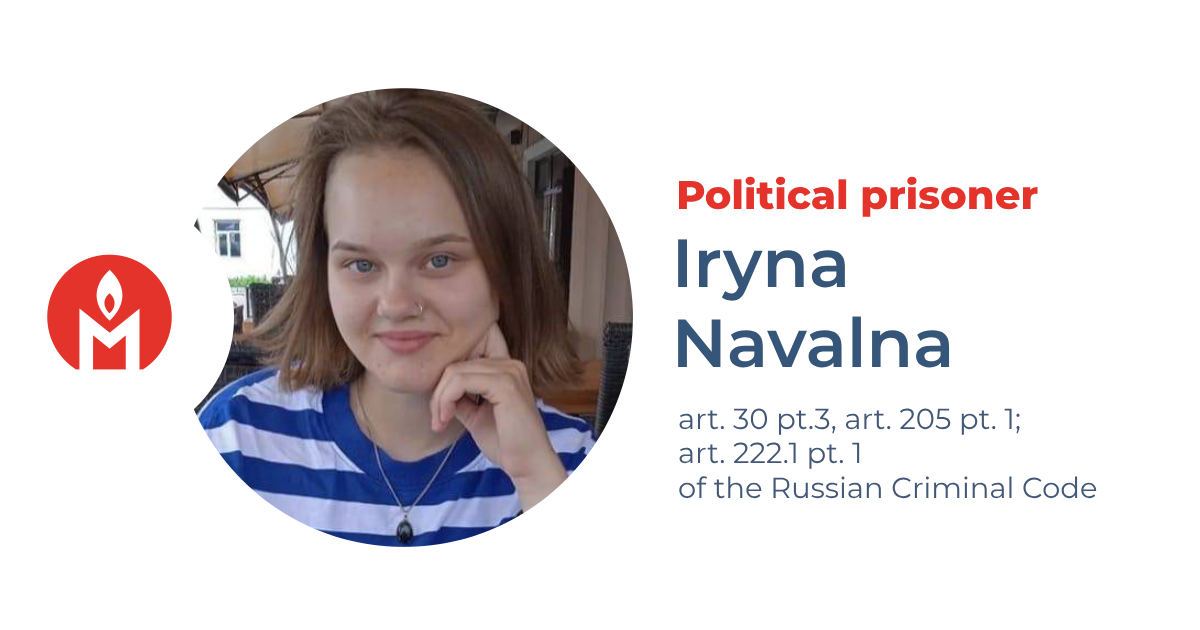Iryna Navalna is a political prisoner
A Ukrainian has been sentenced to eight years in a penal colony on a charge of preparing to carry out a terrorist attack in Mariupol
The ‘Political Prisoners. Memorial’ human rights project, in accordance with international standards, considers Iryna Navalna a political prisoner. Iryna Navalna has been convicted of attempting to commit an act of terrorism and illegal possession of explosives for allegedly preparing to bomb a polling station in Mariupol. However, her prosecution and conviction appear to have been based on fabricated evidence and violated her right to a fair trial. We demand the immediate release of Iryna Navalna and that all criminal charges against her be dropped. We also demand that her allegations of torture be investigated and those responsible be held accountable.

What were the charges against Iryna Navalna?
In May 2022, Iryna Navalna and her mother fled Russian-occupied Mariupol. Later that year, towards the end of August, she returned to the city to visit her grandmother and collect her belongings.
On 27 September 2022, while out riding a bicycle, she was detained by Russian security forces. According to Navalna, she was taken to a police station, beaten, and then held in an unknown location for a month.
On 28 October 2022, she was remanded in custody and charged with attempting to carry out a terrorist attack (Article 30, Part 3, in conjunction with Article 205, Part 1, of the Russian Criminal Code) and with possession, storage, and transportation of an explosive device (Article 222.1).
According to the investigative authorities, on the last day of the ‘referendum’ on Russia’s annexation of occupied Ukrainian territories, Navalna—allegedly acting on orders from Ukrainian intelligence—planned to plant and remotely detonate a bomb at a polling station inside a district administration building in Mariupol. They further claimed that Navalna failed to detonate the device because she had forgotten the remote control at home. When she returned to the scene, she was arrested by ‘state security officers of the Donetsk People’s Republic.’
Navalna was then held for a year in a remand prison in Donetsk, where she was likely subjected to torture. She was also forced to appear in a propaganda film by the Russian state-controlled NTV station. However, in court, she retracted her confession and pleaded not guilty.
On 7 October 2024, a military court sentenced her to serve eight years in a general regime penal colony.
Why do we consider Iryna Navalna a political prisoner?
We believe the case against Iryna Navalna was fabricated, the charges against her were never proven and her conviction relied primarily on a forced confession. Navalna was, in essence, abducted, unlawfully detained for a month in an unknown place, and subjected to torture.
The prosecution’s key witness, a police officer, later retracted his testimony in court. The investigative authorities did not attempt to identify the individuals who allegedly persuaded Navalna to attempt the act of terrorism and presented no evidence—such as DNA or fingerprints—linking her to the explosive device or remote control.
Navalna was likely targeted because of her background. Her surname and tattoos drew the attention of security forces. At the same time, her stepfather served in the Azov regiment and was captured by Russian forces, while before the occupation she herself had interned with the Ukrainian police.
A detailed description of Iryna Navalna’s case and of our position is available on our website.
Recognition of an individual as a political prisoner does not imply the ‘Political Prisoners. Memorial’ human rights project agrees with, or approves, their views, statements, or actions.
How can you help?
You can write to Iryna Navalna at the following address:
In Russian:
346408, Ростовская обл., Новочеркасск, ул. Украинская, д. 1, ФКУ СИЗО-3 ГУФСИН России по Ростовской области, Навальной Ирине Сергеевне 1998 г. р.
English translation:
Iryna Serhiyivna Navalna (born 1998), Remand Prison No. 3, Federal Penitentiary Service of Russia for Rostov Oblast, 1 Ukrainskaya Street, Novocherkassk, Rostov Oblast, 346408, Russia.
You can also send emails via ZT (for payment with Russian bank cards), OVD-Info and Memorial-France (free of charge).
Please note that letters in languages other than Russian are highly unlikely to reach the recipient.
You can donate to help all political prisoners in Russia.
